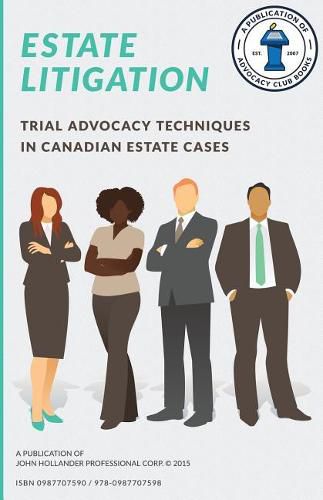Readings Newsletter
Become a Readings Member to make your shopping experience even easier.
Sign in or sign up for free!
You’re not far away from qualifying for FREE standard shipping within Australia
You’ve qualified for FREE standard shipping within Australia
The cart is loading…






Why is estate litigation different from other areas of court cases? Like family law, the parties usually know each other. Also like family law, emotions and memories play important - often dominant roles. Unlike family law, the parties are usually dealing with OPM - other people’s money. Estate law is an off-shoot of the law of equity. Estate cases deal with trusts, either expressed or implied by law.Guardianships, powers of attorney, trustees, executors, all these situations involve people who act or are deemed to act on behalf of others. This creates conflicts of interest, self-dealing in place of integrity, suspicious circumstances.The law that governs these situations arises from before the times of Charles Dickens and Bleak House. The court practice tends to depart from the typical rules of civil procedure that govern torts and contract cases. Why? Because the parties are different than the courts encounter in typical civil cases.This handbook starts with a discussion of the practical differences between civil and estate litigation. Using a case study that arises all too often, the reader is guided through the stages of estate litigation. As with the other handbooks in the Advocacy Club Series, there are examples and practical techniques designed to show the civil litigator the best practices of the estates litigator.Although written for Canadian lawyers and using Canadian case law as examples, this handbook presents practical techniques that apply to lawyers in all common law jurisdictions.
$9.00 standard shipping within Australia
FREE standard shipping within Australia for orders over $100.00
Express & International shipping calculated at checkout
Why is estate litigation different from other areas of court cases? Like family law, the parties usually know each other. Also like family law, emotions and memories play important - often dominant roles. Unlike family law, the parties are usually dealing with OPM - other people’s money. Estate law is an off-shoot of the law of equity. Estate cases deal with trusts, either expressed or implied by law.Guardianships, powers of attorney, trustees, executors, all these situations involve people who act or are deemed to act on behalf of others. This creates conflicts of interest, self-dealing in place of integrity, suspicious circumstances.The law that governs these situations arises from before the times of Charles Dickens and Bleak House. The court practice tends to depart from the typical rules of civil procedure that govern torts and contract cases. Why? Because the parties are different than the courts encounter in typical civil cases.This handbook starts with a discussion of the practical differences between civil and estate litigation. Using a case study that arises all too often, the reader is guided through the stages of estate litigation. As with the other handbooks in the Advocacy Club Series, there are examples and practical techniques designed to show the civil litigator the best practices of the estates litigator.Although written for Canadian lawyers and using Canadian case law as examples, this handbook presents practical techniques that apply to lawyers in all common law jurisdictions.